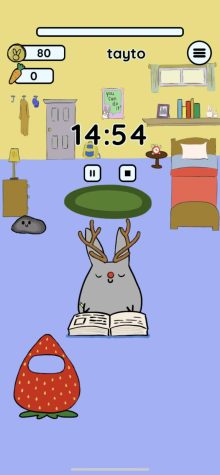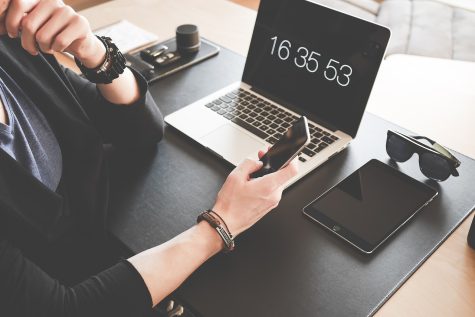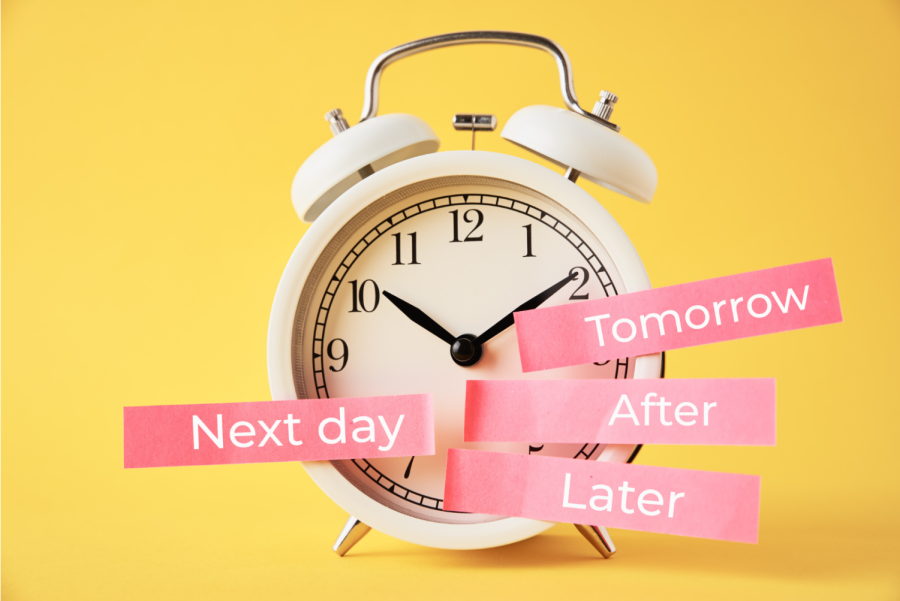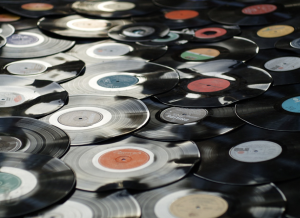The Plight of a Procrastinator on Vacation
February 15, 2022
It’s the night before school starts back up again after a break. You just spent the past 9 days binging shows on Netflix and watching YouTube; but now, it’s time to finish (and start) your 7 page paper on a historical figure of your choice. It’s 10:01 pm. You work furiously until 3 am, pass out in a sleepless heap at your desk, wake up at 7:00 am, and suddenly realize that you didn’t finish your project. You immediately jump into action and finish the rest of the project in a mere 20 minutes.
When you’re given a long break from school, it’s easy to push off your work until later. At the beginning of your vacation, you’re excited to relax and stop thinking about school for a bit. But towards the end, your vacation tends to get stressful fairly quickly as you realize how many things you need to do before school starts.
”I’ll do that tomorrow. I have plenty of time.”
During a long break from school, it becomes very easy for us to push our work to our “tomorrow.” As each day goes by, you consistently tell yourself that you’ll have time to finish your work “tomorrow.” But suddenly, it’s the night before school starts and you have 7 unfinished assignments and only an hour or two before you need to sleep.
To avoid this situation, try making daily to-do lists and schedules that you can follow. Some people like using paper planners, some prefer digital planners, and others even write their to-do lists on post-its. No matter how you choose to keep track of your unfinished assignments, you should create an organized plan that you’ll stick to. If you have a big homework assignment that you know will take a while to complete, try breaking up the work and working on it, bit by bit, over the course of a couple of days.

Maintain a (fairly) regular sleep schedule
As fun as watching Netflix until 4 am on a Friday night can be, waking up at noon the next morning isn’t. You feel as if you’ve slept through most of the day and don’t have enough time to do the things you need to do. Thus, you stay up late finishing your tasks on Saturday night and do the same on Sunday night, perpetuating the unhealthy cycle.
We’ve all been told that sleep is important to our health, but sleep is especially important during today’s pandemic era. Our immune systems are strengthened with rest, and we need our immune systems to be working efficiently in case we get sick. According to the American Academy of Sleep Medicine, teens who are between the ages of 13 and 18 should aim for 8-10 hours of sleep per night. Fixing your sleep schedule during a vacation is one of the best things you can do for yourself. You’ll be able to get up earlier, feel refreshed, and have time to get things done earlier so that you can have free time later in the day.

Grab a buddy to help you study
When you’re doing your work alone in your room, with your phone just inches away, you’ll likely feel tempted to go on your phone instead of doing your science homework. After what seems like a couple of minutes go by, you look at the clock and realize that you’ve been on your phone for an hour.
No one likes the feeling they get when they’ve procrastinated, so try to limit the distractions in your workspace. If you are unable to do so, you can also ask someone to help keep you accountable. You should tell them how much work you want to get done and what time you want to be done by, and hopefully, they’ll be able to make sure you don’t get off track. For instance, you could ask your sibling to hide your phone for a certain period of time while you work. You can also download certain apps, such as Flora or Study Bunny, which limit your phone usage and give you a reward for not touching your phone during your chosen time period.
If you’re feeling unmotivated, try calling or meeting up with a friend to study or work together. You can work for a bit and chat during your break to make doing work more enjoyable. If you see someone else being productive, it may help you follow their example.
A change in setting may also help you stay focused. If you do your work in a commonplace, such as a library or even your dining room, you may feel a little more pressure to stay productive (or at least fake it until you make it).

Cut yourself some slack and take a break
If you’ve ever worked for a long period of time, you know that you’ll feel tempted to take a long break afterward. Sometimes, this break may last longer than what you intended, which then halts your productivity.
You can prevent this feeling of being burnt out by taking short breaks while doing your work. Even if you think that working with no breaks will help you get your work done faster, it may slow the rate at which you work or even the quality of your work. If you work with no breaks, your brain will eventually get tired and you may start taking the “easy way out” when doing your tasks. Instead of writing a detailed and lengthy response to a question, you may rush by writing a short, 3 sentence paragraph.
Most people can concentrate for anywhere from 30 to 90 minutes at a time (before they need to take a break). You can use your vacation to figure out what your ideal ratio of work time to break time is.

Give your body some TLC
Breaks are a great tool to help boost your productivity; however, remember that there is a difference between a productive and a nonproductive break. Make sure you have a goal for what you want to do on your break. Picking up your phone to scroll on social media may not be the best way to spend your break, but you can spend a break effectively by going to your kitchen and grabbing a snack or some water. You can also try and get some fresh air and exercise while on your break. This stops you from going on your phone and getting distracted while also giving your body a chance to slow down and breathe for a bit.
At the end of a long day of work, some people may also like journaling, or writing down their thoughts. If you’re stressed or worried over something, you can use a journal in order to get your thoughts out. Other people like to express their feelings through drawing. Try and find some sort of outlet for your stress to flow out through. Letting go of your lingering stress, especially while on vacation, can help you enjoy your vacation much more.
Learning how to be productive now, while you’re in high school, can be beneficial for your near future. Many high school students go on to college after high school, which is a time when students are given almost complete freedom over their lives for the first time. Therefore, it is important to learn how to keep yourself accountable once you get to that point of independence. Balancing work and play can be challenging, but finding a good balance lets you relax and work productively during your long vacations and everyday life.








Brian • Feb 19, 2022 at 5:22 pm
Thanks, Kelly! This is very helpful for me.